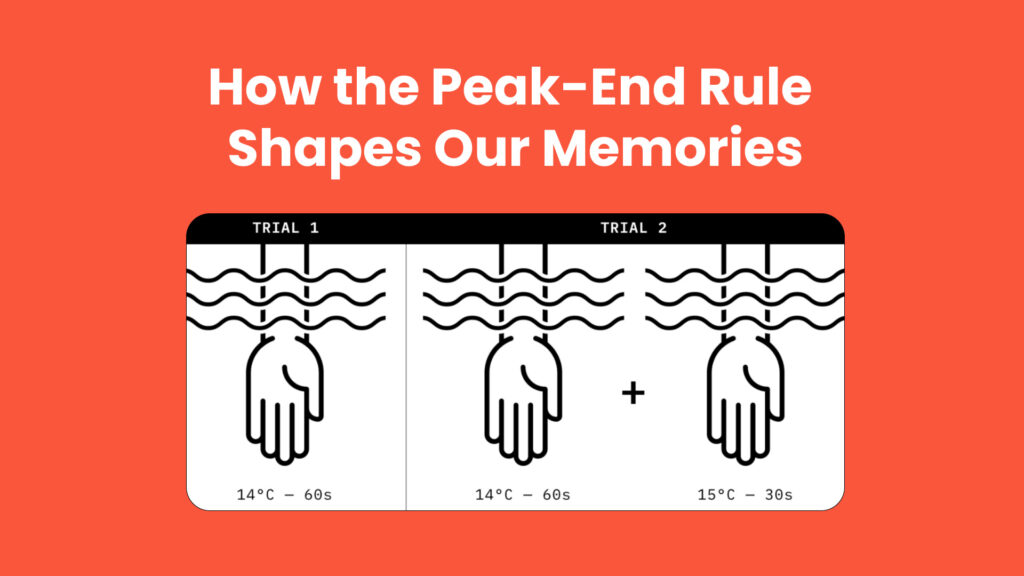How the Peak-End Rule Shapes Our Memories: Why We Sometimes Prefer More Pain

Pain is an inescapable part of the human experience, yet our perceptions and memories of pain are often counterintuitive. A landmark psychological experiment by Daniel Kahneman and Barbara Fredrickson in 1993, and discussed in a recent transcript, reveals intriguing aspects of how we perceive and remember pain, primarily through the “peak-end rule.” This article explores this experiment and extends its implications to mental health, offering insights into how we can improve psychological well-being by understanding pain perception.
The Cold Water Experiment: Exploring the Depths of Pain Perception
Imagine being asked to plunge your hand into a bucket of ice-cold water. It sounds simple but unpleasant, right? In this experiment, participants did exactly that, submerging their hands in cold water while rating their discomfort in real time.
The experiment had two parts: in the first trial, participants submerged their hands in 14°C (57°F) water for 60 seconds. In the second trial, participants submerged their hands in the same 14°C water for 60 seconds, but then kept their hands in the water for an additional 30 seconds, during which the temperature rose slightly to 15°C (59°F).
Despite experiencing a longer duration of discomfort, most participants preferred the second trial when asked which one they would choose to repeat. This preference is counterintuitive because the second trial includes all the discomfort of the first trial plus 30 additional seconds of cold.
Duration Neglect: The Overlooked Factor
Closely related to the peak-end rule is the concept of “duration neglect,” where the length of an experience has little impact on how it is remembered. This means that our memories of events are not significantly influenced by how long they last but rather by the nature of the most intense and final moments.
For example, vacations are often remembered not for their length but for memorable moments—both good and bad. A short vacation with a few high points can be remembered more fondly than a longer one with more mundane experiences.
Implications for Mental Health
Understanding the peak-end rule and duration neglect has profound implications for mental health:
- Therapy Sessions:
- Positive Conclusions: Ending therapy sessions on a positive note can enhance overall satisfaction and encourage clients to continue therapy. For instance, summarizing progress made during the session or setting a positive goal for the next session can create a favorable memory.
- Managing Intense Moments: Therapists can help clients navigate through peak moments of distress by using grounding techniques or relaxation exercises towards the end of the session, leaving the client with a sense of relief and accomplishment.
- Support Groups:
- Shared Experiences: In support groups, sharing high-impact success stories or positive experiences at the end of meetings can create lasting positive impressions, motivating members to return and stay engaged.
- Positive Reinforcement: Ending sessions with positive affirmations or mindfulness exercises can leave participants feeling uplifted.
- Crisis Intervention:
- Effective De-escalation: During crisis intervention, it’s crucial to ensure that the last part of the interaction is calm and supportive, which can help the individual remember the encounter more positively and feel more hopeful about seeking help in the future.
- Daily Coping Strategies:
- Positive Endings: Individuals can apply these principles in their daily lives by ending stressful activities with something pleasant, such as listening to calming music after a long day or enjoying a favorite hobby after a challenging task.
- Reflective Practices: Journaling about positive moments at the end of the day can help reinforce a positive outlook and improve overall mental health.
Case Studies and Real-Life Applications
Case Study – Mindfulness and Stress Reduction: Consider mindfulness practices that often end with a guided relaxation or visualization. Participants might go through uncomfortable emotions or thoughts during the session, but ending with a soothing visualization can leave a lasting positive impact, making them more likely to engage in future sessions.
Case Study – Group Therapy Dynamics: In group therapy for trauma survivors, sessions might involve discussing painful experiences, which can be intense. However, ending with group activities that promote connection and support, such as sharing personal victories or participating in a light-hearted exercise, can create a positive ending that helps participants remember the session favorably.
Case Study – Cognitive Behavioral Therapy (CBT): CBT sessions often include challenging cognitive distortions and confronting uncomfortable truths. By concluding sessions with a review of cognitive restructuring achievements and setting empowering homework assignments, therapists can ensure that clients leave with a sense of accomplishment and hope.
A Case for Better Mental Health Support
Better understanding of pain perception and memory can inform mental health support initiatives. BetterSpace, a mental health organization, uses technology and innovative approaches to provide accessible and culturally relevant mental health resources. Their services include counseling, community support, and self-care tools, all designed to address the unique challenges faced by individuals in different contexts.
By recognizing how people remember and perceive their experiences, mental health programs can be tailored to create positive peak moments and supportive conclusions, enhancing overall effectiveness. This approach not only helps individuals manage their mental health better but also encourages them to seek and continue treatment, fostering long-term well-being.
Conclusion
The cold water experiment by Kahneman and Fredrickson offers profound insights into human perception of pain and discomfort. The preference for a longer, but slightly less painful ending highlights the importance of peak and end moments in shaping our memories. Applying these principles can significantly improve mental health therapy, support groups, crisis interventions, and daily coping strategies, leading to better outcomes and more positive experiences. By focusing on key moments and ensuring positive conclusions, we can create lasting, favorable memories, even in the face of discomfort.













ykhdek
1fxqzx
uqj0z8
on50eh
0rir34
7dcc3b
5omgqp